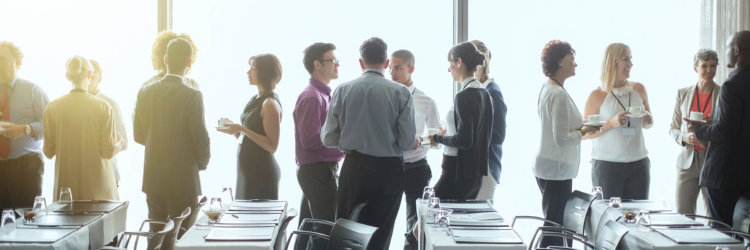Articles
Advice from a Treasury Recruiter on Networking
- By AFP Staff
- Published: 6/6/2023

The career benefits of networking are numerous, including gaining more exposure to career opportunities and learning from peers with similar interests. How can treasury professionals expand and maintain their network?
Mike Richards, CEO and Founder of The Treasury Recruitment Company, answers questions that treasury professionals submitted on this topic during the AFP webinar, Achieving Career Success Through Effective Networking and a Strong Personal Brand.
This article is part of a four-part series, How to Achieve Career Success Through Networking and Personal Branding.
What is the best way to authentically connect and network with others?
Richards: The first thing is to be yourself. Do not put on a persona. Do not be someone you’re not.
Be authentic about the things you are doing and the areas in which you want to grow. If you reach out to someone and ask them to help you, it will be difficult for them to say no, as people naturally want to help each other.
One way to network with others is to attend conferences and webinars. These events give you the opportunity to meet other individuals with similar interests. Engage in conversations. People will be interested because they can learn from your experiences, and you can learn from theirs.
On LinkedIn, you can widen your network by joining groups and participating in discussions. Pay it forward as well. Offer assistance or support to others in your network when you can. If you are willing to give value forward, it will come back to you at a later stage. That being said, when you’re helping others, don’t think about what’s in it for you.
How do you maintain your network? You meet someone at an event. How do you stay in touch over time?
Richards: You’re very busy. Everybody is busy. No kidding! But you have to do the work if you want to keep the relationship going. Let’s talk about the word net-WORK. It’s work. It's not easy!
If you meet someone, make a note about what you spoke up about, then reference this when you follow up with them after the event. This personalizes your connection. Connect with them on LinkedIn as well. Share relevant content and engage with their posts. If you can, schedule check-ins.
But I’m really busy. I struggle to find time to maintain relationships. What other ways can I keep in touch with people?
Richards: It’s important to connect with people. Make time for it, even put it into your schedule once a week. It could be as small as 10-15 minutes on a Friday morning, just before you kick off your day. Get your first coffee and reach out to three to five people.
Someone mentioned that they have a bucket list of curiosity questions to ask others, so they have questions ready to go when they meet people. How helpful is this?
Richards: This really helps. Especially if you do this in addition to preparing your elevator pitch on who you are, what you do and what difference you’ve made at the company.
Questions you could ask include:
- How did you first get into treasury?
- What are some challenges you’ve faced in your current role? Past role? When making moves? How did you overcome them?
- Are there any trends or technologies you find interesting?
What is the easiest way for an introvert to network with others? How do you overcome social anxiety when networking?
Richards: The first thing is to do one-to-ones. Practice with another person, maybe a friend. Rehearse what you’d say if you were to introduce yourself. Listen to the other person and have a conversation. As you get more comfortable with one-on-ones, gradually, you’ll become more comfortable talking one to two and one to three.
If you’re at an event, set a small, achievable goal for your networking. It could be to speak to five people over the course of two days. Before the event, check the attendee list to see if someone you know will be there. If there is, you could reach out ahead of time to try to connect while you’re both there.
Also, keep an ear out for opportunities to get involved in the discussion. For instance, at a session, you might hear someone ask a question that you have as well. After the session, you could go up to that person and say, “That was a really good question. Is that a challenge you’re facing as well?”
It’s about the quality of conversations rather than the quantity. If you have two or three meaningful conversations, that can be far more powerful than having a lot of conversations without much substance.
Get more career advice from this series, How to Achieve Career Success Through Networking and Personal Branding.
- Advice from a Treasury Recruiter on Finding a Mentor
- Advice from a Treasury Recruiter on Building a Personal Brand
- Advice from a Treasury Recruiter on Achieving Career Success
Get more advice from Mike Richards on LinkedIn.
Copyright © 2024 Association for Financial Professionals, Inc.
All rights reserved.

